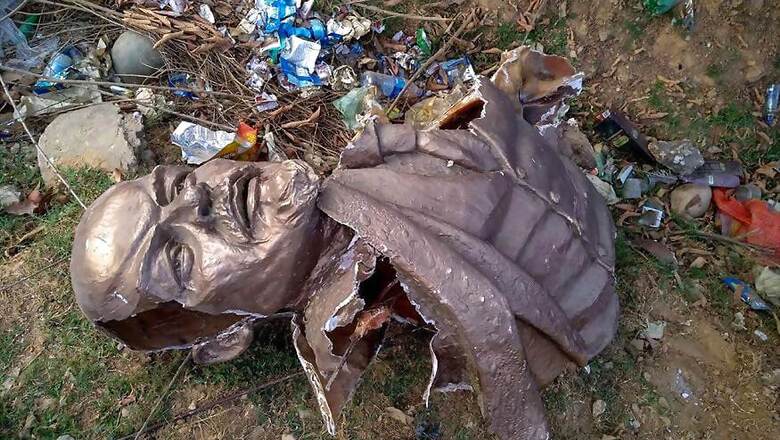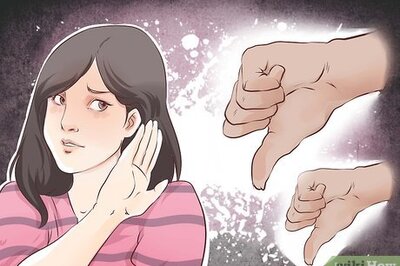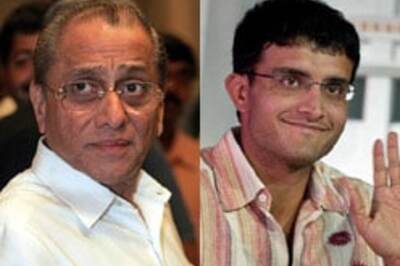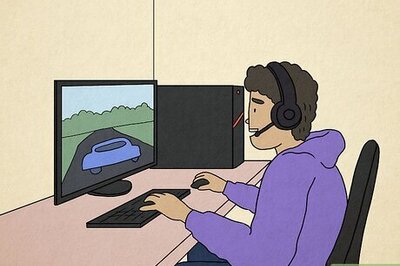
views
Toppled from two pedestals in Tripura, Vladimir Lenin must be chuckling in anticipation of the future. “What one democratically elected government can do, another democratically elected government can undo” gloated Tripura’s governor, Tathagatha Roy, justifying the vandalism. Elections are a continuing process as the great god of Communism (if Communists have a god) understood better than any saffron brigade apparatchik.
“The oppressed are allowed once every few years to decide which particular representatives of the oppressing class are to represent and repress them.” Today it’s Lenin, warned Mamata Banerjee, “tomorrow it will be Gandhi, Subhas Bose or Rabindranath Tagore!”
This was not a victory of ideology but of pragmatism over politics. The Bharatiya Janata Party which swept 43 out of 59 assembly seats contested 50 seats in 2013 when its candidates forfeited their deposits in 49 seats and with only 1.87 per cent of votes, failed to win any seat at all. But despite the governor and his flock, the 40 lakh people of Tripura are not exactly pining for the Hindutva Elysium. The Lotus triumphed over the Hammer and Sickle because what people crave for are the neglected necessities of life -- roti, kapda aur makaan.
With more than seven lakhs unemployed, Tripura desperately needs jobs. That means infrastructure and private investment in industry. The tribals complain of the lack of basic facilities like potable water.
Hindu Sarkar tried Bengalis who have moved from Bangladesh’s adjoining Comilla district complain of illegal Muslim Bangladeshi migrants benefiting from bogus papers. The two Left Front chief ministers, Nripen Chakraborty who held office from 1978 to 1988, and Manik Sarkar who became chief minister in 1998, were both revered by friends and foes alike.
But they signally failed to reconcile ideology with pragmatism. When to come to terms with economic expectations, he was thwarted by hard-line ideologues like Prakash Karat.
Now, as Tripura waits for the economic miracle the BJP promised, it should find the threat of violence more worrying than the demolition of statues. The ousted Communist Party of India (Marxist) naturally blames the BJP. Appealing – ironically – to Narendra Modi for help, a Marxist memorandum complained, "After the election results were out, goons of the BJP have unleashed a reign of terror and all-round attacks on members and supporters of the CPI(M), their houses, party offices and mass organisation offices throughout the state."
It gave a list of the alleged violent incidents, claiming that 514 people were injured and 196 houses set on fire. “We request your immediate intervention to stop these attacks and violence and to maintain peace and normalcy in the state", the memorandum stated, before the situation "worsened".
The plea stirred uneasy memories of the 1980 massacre at Mandwi as Hindutva’s exultant cries of “Jai Siyaram” and “Bharat Mata ki Jai” filled the air. Mandwi is an obscure village some 30 km north-east of the capital, Agartala, inhabited both by Tripuri tribespeople and Hindu Bengalis. Armed militants of the Tripura Upajati Juba Samiti and the National Volunteer Force, a Tripuri rebel group fighting to secede from India, launched a carefully planned attack against the Bengalis.
According to official figures 255 Hindus were massacred but the foreign press cited independent sources and eyewitnesses to put the figure between 350 and 400. Many victims had their heads crushed and limbs severed. Children were spiked through. The stomachs of pregnant women were slashed open. Seeing the savagery and the butchery, the mutilation of hundreds of men, women and children, the Indian army’s Major R. Rajamani, who reached Mandwi a day later, commented that the My Lai massacre in Vietnam was not half as gruesome.
The reason for anxiety about another recrudescence of ethnic violence is that the tribals are now with the BJP on the winning side. The TNV, which surrendered in 1988 and formed a political party, merged in 2000 with the Indigenous Peoples Front of Tripura to form the Indigenous Nationalist Party of Twipra led by Bijoy Kumar Hrangkhawl. The IPFT is Tripura’s main tribal organisation. It is at loggerheads with the CPI(M)’s tribal branch, the Tripura Rajya Upajati Ganamukti Parishad, and minor physical clashes between the two groups are frequently reported.
The IPFT and the Twipraland State Party have also been agitating since 2009 to upgrade the existing Tripura Tribal Areas Autonomous District Council (TTAADC) into a separate tribal state to be called Twipraland. The TTAADC now has jurisdiction over two-thirds of Tripura's 10,491 sq. kms., where nearly 13 lakh people, mostly tribals, live.
Amit Shah, the BJP president, who sees Tripura as a stepping stone to the conquest of Karnataka and West Bengal, sidestepped that core conflict on the eve of the election when he urged all his “brothers and sisters of Tripura to come out and vote in large numbers”, saying their “vote will lay the foundation of a prosperous and developed Tripura". The BJP’s state unit president, Biplab Kumar Deb, and now chief minister designate, was closer to the truth. The election results would be “historic” he declared, gloating that both Mr Modi and Mr Shah had called him with their “good wishes". Much will depend now on how forcefully the IPFT presses the Twipraland demand as the price of its electoral cooperation, and how the BJP’s central leadership responds.
Tripura’s per capita income is below the national average but the state is the principal employer. The wage bill is a heavy burden on an impoverished exchequer, and Tripura still pays only the rates prescribed by the Fourth Pay Commission. The BJP’s promise to implement the Seventh Pay Commission’s recommendations means that the salary of a government servant who now draws Rs 20,000 a month will at once jump to at least Rs 35,000. Lenin might have understood the economic rationale for paying allegiance to the Lotus, at least as a stopgap measure.
(Mr Datta-Ray is a journalist and author of several books. He has been editor of The Statesman. Views are personal)

















Comments
0 comment